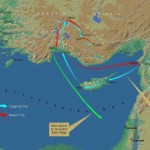New disciples = new disciple makers in Acts 13

In Acts 13, Luke begins by describing how both the Holy Spirit and the church in Antioch sent out Barnabas and Paul. (Acts 13:1-4) The two traveled from Antioch to the port of Salamis, and from there they took a ship to Cyprus.
Once they spent some time in a couple of cities on the island of Cyprus, they boarded another ship and sailed to Perga. (Acts 13:5-12) From there, they traveled to another city called Antioch. This Antioch was in the region of Pisidia. (Acts 13:13-14)
On the first Sabbath that they were in Antioch of Pisidia, Barnabas and Saul proclaimed the good news of Jesus Christ to Jews who were gathered as a synagogue. (Acts 13:15-41) People begged Barnabas and Paul to come back the next Sabbath and teach again concerning the gospel. Some took it a step farther and followed Paul and Barnabas, and, as the text insinuates, begins living in the grace of God. (Acts 13:42-43)
But, then, things get ugly. You see, according to Luke, “the whole city” becomes interested in the message of the gospel and show up at the synagogue meeting the next Sabbath. The Jews get jealous and begin reviling Paul and Barnabas, who then begin to share the gospel directly with the Gentiles. (Acts 13:44-47) The Gentiles (non-Jews) are overjoyed at hearing the message of Jesus Christ and many believed. (Acts 13:48)
This brings me to the point that I want to consider in this post. After Luke says that many Gentiles believed, he makes another interesting statement:
And when the Gentiles heard this, they began rejoicing and glorifying the word of the Lord, and as many as were appointed to eternal life believed. And the word of the Lord was spreading throughout the whole region.
How was it possible for “the word of the Lord” to spread throughout the whole regions (not the city… but the region)? Were Paul and Barnabas responsible for spreading the message of the gospel throughout the region? No, it would be logistically impossible.
Instead, these new believers – these Jews and Gentiles who had only heard the gospel a few days previously – these immature believers who had not had disciples classes or evangelism training or Bible schools or anything like that – these people shared the good news of Jesus Christ to the region around their city and discipled those who believed. And, they did it immediately after they believed.
Oh, how things have changed…

It is sad that even the great apostle Paul could not reign in the immature new believer from thinking they can just go out and tell everyone they know about Jesus.
Such an ineffective method that brings shame and slander to the glorious G-o-s-p-e-l. Just the other day I heard about a discipleship program that will reach the whole world in 22 years, by each believer training another believer for a year to go tell one person the gospel, and then having them train that person for a year. Quite a clever solution!
Today, we have keeping these naive new believers under our control quite down to a science. And, we can offer them classes and training and after only one year turn them loose to multiply themselves one by one. If only Paul, M Div–or at least the learned Luke, MD–had known the power of math in reaching the world. We’d never have had to been born! The job would have been done centuries ago.
Alan,
Good word!
A long time ago, a twelve year old girl, was with a group of students who were evangelizing in the main shopping area of one of our major cities. The girl was the daughter of one of the students.
I learned a great lesson about our foolish attempts to be sophisticated in the way we approach people and speak to them (far too often it is speak down to them).
Adults would stop and give careful attention to her simple explanation of what her Savior had done for her, whilst brushing we older ones off. They would put the literature in their pockets, while that given by the “learned” students ended up in the trash cans.
I’d like to know how they got their leave-about tracts, gift New Testaments and stamped 10 commandment coins delivered that quickly.
This is so true and glorious. But one thought occurs to me:
How do we translate this in America? To those people, this was brand new I think, and very liberating and so they welcomed it enthusiastically. In the U.S., the mass of population has been inoculated against the Gospel by hundreds of years of abuse by the institutional church — overpoliticized, hypo(and hyper-)critical, unloving, judgmental,ritualized professional. My wife says it seems we’re always fighting a two-front war — one with the unsaved and one with the traditional church. I feel every time I share my faith with someone i have to first issue a disclaimer that I’m not “Christian” the way they think of the term.
Thanks for the comments everyone.
Dan, asks a great question… how do we translate this into America – or any other modern culture? Is the good news still good news?
-Alan